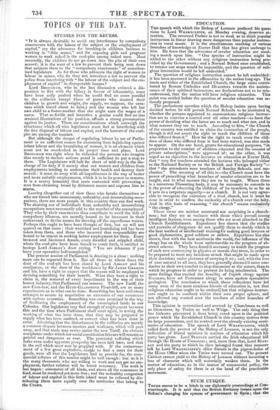TOPICS OF THE DAY.
STUDIES FOR THE RECESS.
'SIT is always desirable to avoid any interference by compulsory enactments with the labour of the subject or the employment of capital," cry the advocates for breaking-in children betimes to working in "thin seams," and for exposing girls and pregnant women to work naked in the coal-pits among naked men. Most assuredly, the children do not go down into the pits of their own accord : it is the want of a law to prevent their being sent down that subjects them to the "compulsory enactments" of unauthor- ized legislators. As for those who advocate the right of women to labour in mines, why do they not introduce a law to prevent the police from interfering with "the labour of the subject and the em- ployment of capital" in disreputable houses ?
Lord BROUGHAM, who in the last discussion evinced a dis- position to flirt with the fallacy in favour of inhumanity, Must have been sadly pushed when he could find no cases parallel to the collieries except those of parents who stunted their children in growth and weight, (to supply, we suppose, the cara- vans which travel about to fairs,) and the woman who left her own child to a foster-mother that she might earn the wages of a nurse. That so fertile and inventive a genius could find no less strained illustrations of his position, affords a strong presumption against its justice. There are considerations which outweigh the reluctance which all wise legislators must feel at interfering with the free disposal of labour and capital, and the horrors of the coal- pits are among the number.
But although the danger of regulating labour by act of Parlia- ment is no sufficient reason for abstaining from legislating against infant labour and the brutalizing of women, it is an element which must not be overkoked in its proper time and place. Lord BROUGHAM was right when he ridiculed the persons who imagine that merely to declare actions penal is sufficient to put a stop to them. The Legislature will halt far short of mid-way in the dis- charge of its duty if it merely shut out women and children from employments tending to undermine their health and destroy their morals : it must do away with all impediments in the way of better and more suitable employments, which it is in its power to remove. It is a scurvy humanity that rests contented with preventing a man from obtaining bread by dishonest means and exposes him to starve.
Leaving altogether out of view those who betake themselves or who are forced into unnecessary, unhealthy, and demoralizing occu- pations, there are more people in this country than can find work. The shutting out of individuals from unhealthy and demoralizing occupations must necessarily add to the number of the unemployed. They who by their enactments thus contribute to swell the tide of compulsory idleness, are morally bound to be incessant in their endeavours to devise means for drawing off the superfluous waters. Perhaps this ought to have been thought of first, but we will not quarrel on that score : their wretched and brutalizing toil has been taken from them, and those who incurred that responsibility are bound to be urgent in seeking better employment for them. Every bronzed, and hardened female, every dwarfed and crippled child, whom the coal-pits have been forced to vomit forth, is entitled to besiege Lord ASHLEY'S door crying, "You are inhuman if you leave your operation half-completed."
The present session of Parliament is drawing to a close : nothing more can be expected from it. But all those in whose faces the door of the coal-pit has been closed by Lord ASHLEY and his coadjutors, or the door of the workhouse by Sir JAMES GRAHAM and his, have a right to expect that the recess will be employed in devising something for their benefit. What they have a right to claim is, the removal of every impediment in the way of their honest industry, that Parliament can remove. The new Tariff, the new Corn-law, and the Hurr-GLAnsTortE Flour-bill, are so many experiments as to what can be done. Something has been said about attempts to secure by negotiation an extension of our commerce with various countries. Something was once promised in the way of facilitating the employment of' the unoccupied lands in our Colonies. Our legislators may find enough of employment between this and the time when Parliament shall meet again, in noting the working of what has been done, that they may be prepared to supply what has been omitted, or correct what has been done in error. Admitting that the disturbances in the collieries are merely a common dispute between masters and workmen, which will pass away, and that trade may revive under the new Tariff, the chronic complaints under which our social constitution labours will remain as painful and dangerous as ever. The perennial suffering which lurks even under apparent prosperity has been laid bare, and that is the evil which must now be grappled with. If the embarrass- ment of a few great capitalists, unaWe to find a mart for their goods, were all that the Legislature lad to provide for the com- mercial reforms of this session might be well enough: but as it is the many thousands who are willing to work and can get no em- ployment, further reforms will be found necessary. The work is but begun : commerce of all kinds, and above all the commerce in food, must be rendered yet more free ; and the unhealthy congestion of labour and capital in this little island must be relieved by dis- tributing them more equally over the territories that belong to the Crown.


























 Previous page
Previous page